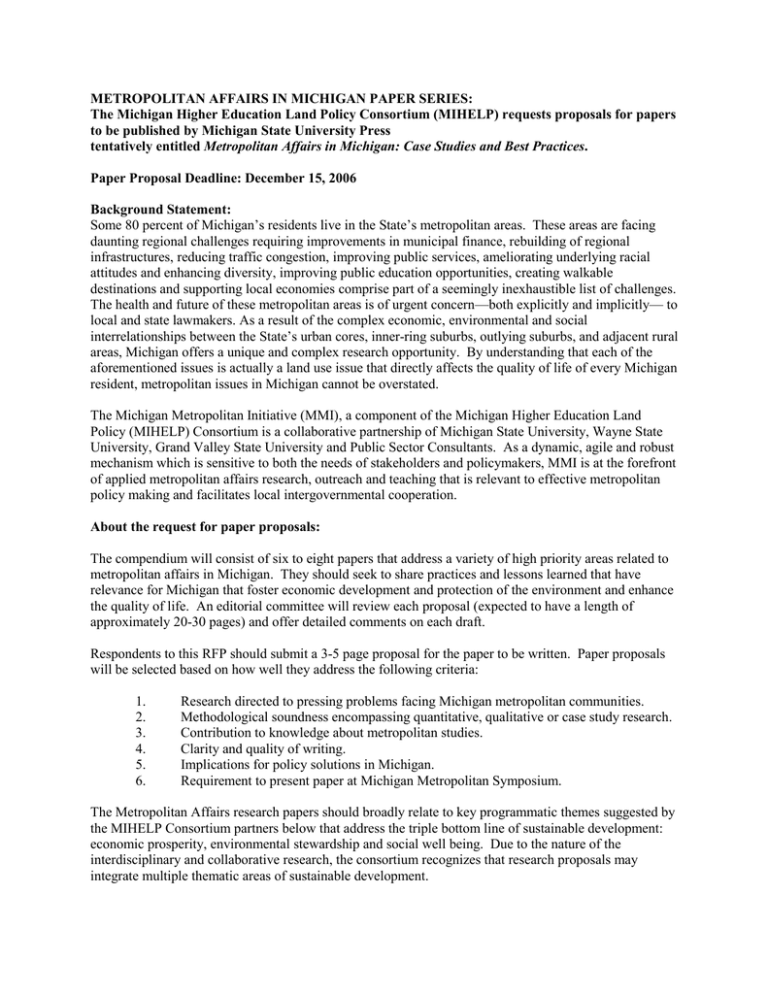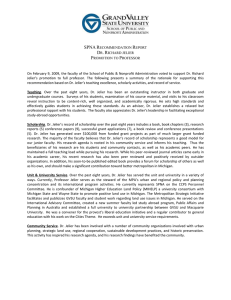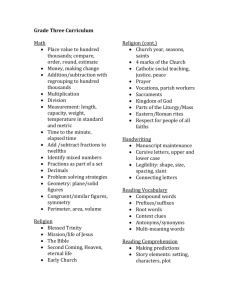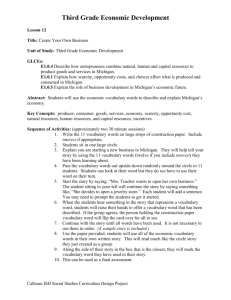METROPOLITAN AFFAIRS IN MICHIGAN PAPER SERIES:
advertisement

METROPOLITAN AFFAIRS IN MICHIGAN PAPER SERIES: The Michigan Higher Education Land Policy Consortium (MIHELP) requests proposals for papers to be published by Michigan State University Press tentatively entitled Metropolitan Affairs in Michigan: Case Studies and Best Practices. Paper Proposal Deadline: December 15, 2006 Background Statement: Some 80 percent of Michigan’s residents live in the State’s metropolitan areas. These areas are facing daunting regional challenges requiring improvements in municipal finance, rebuilding of regional infrastructures, reducing traffic congestion, improving public services, ameliorating underlying racial attitudes and enhancing diversity, improving public education opportunities, creating walkable destinations and supporting local economies comprise part of a seemingly inexhaustible list of challenges. The health and future of these metropolitan areas is of urgent concern—both explicitly and implicitly— to local and state lawmakers. As a result of the complex economic, environmental and social interrelationships between the State’s urban cores, inner-ring suburbs, outlying suburbs, and adjacent rural areas, Michigan offers a unique and complex research opportunity. By understanding that each of the aforementioned issues is actually a land use issue that directly affects the quality of life of every Michigan resident, metropolitan issues in Michigan cannot be overstated. The Michigan Metropolitan Initiative (MMI), a component of the Michigan Higher Education Land Policy (MIHELP) Consortium is a collaborative partnership of Michigan State University, Wayne State University, Grand Valley State University and Public Sector Consultants. As a dynamic, agile and robust mechanism which is sensitive to both the needs of stakeholders and policymakers, MMI is at the forefront of applied metropolitan affairs research, outreach and teaching that is relevant to effective metropolitan policy making and facilitates local intergovernmental cooperation. About the request for paper proposals: The compendium will consist of six to eight papers that address a variety of high priority areas related to metropolitan affairs in Michigan. They should seek to share practices and lessons learned that have relevance for Michigan that foster economic development and protection of the environment and enhance the quality of life. An editorial committee will review each proposal (expected to have a length of approximately 20-30 pages) and offer detailed comments on each draft. Respondents to this RFP should submit a 3-5 page proposal for the paper to be written. Paper proposals will be selected based on how well they address the following criteria: 1. 2. 3. 4. 5. 6. Research directed to pressing problems facing Michigan metropolitan communities. Methodological soundness encompassing quantitative, qualitative or case study research. Contribution to knowledge about metropolitan studies. Clarity and quality of writing. Implications for policy solutions in Michigan. Requirement to present paper at Michigan Metropolitan Symposium. The Metropolitan Affairs research papers should broadly relate to key programmatic themes suggested by the MIHELP Consortium partners below that address the triple bottom line of sustainable development: economic prosperity, environmental stewardship and social well being. Due to the nature of the interdisciplinary and collaborative research, the consortium recognizes that research proposals may integrate multiple thematic areas of sustainable development. ECONOMIC PROSPERITY IN MICHIGAN METROPOLITAN COMMUNITIES 1. New Policy Tools/New Market Tools for Revitalizing Michigan Cities 2. Downtown and Neighborhood Revitalization 3. Sprawl Effects-Causes, Winners and Losers 4. Municipal Finance Reform and Revenue Sharing 5. New Strategies for Metropolitan Economic Development 6. Technological Transfer of Michigan Universities and Public/Private Partnerships 7. Transportation System Breakthroughs 8. Impact of Regional Infrastructure 9. Multijurisdictional Cooperation as it relates to Regionalism ENVIRONMENTAL STEWARDSHIP IN MICHIGAN METROPOLITAN COMMUNITIES 1. Link Between Agricultural Preservation and Urban Reinvestment 2. Enhanced Planning and Coordination in Land Use Decision Making 3. Empowering Michigan’s Citizens in Land Use 4. Open space preservation 5. Successful Growth Management Strategies 6. Assessment of Metropolitan Environmental Factors and Quality of Life 7. Brownfield Redevelopment 8. The impacts of the interdependence of urban cores, inner-ring suburbs, outlying suburban areas, and adjacent rural areas SOCIAL WELL BEING IN MICHIGAN METROPOLITAN COMMUNITIES 1. Housing Equity and Suburban Housing Affordability 2. Social and Ecological Impacts of Household choice 3. Gentrification Issues 4. Creating Healthy Communities 5. The Effects of Racial Attitudes on the Perceptions of Michigan Cities and Recommendations for Relevant New Metropolitan Strategies 6. The Creative Class and Metropolitan Communities: Brain Drain and Talent Retention Proposal and Program Timeline: 1. 2. 3. 4. 5. 6. December 15, 2006 January 31, 2007 May 15, 2007 June 15, 2007 July 31, 2007 September 15, 2007 Proposals Due Notice of Acceptance Draft Papers Due First Revisions Final Papers Due Publication and Presentation at Conference Proceeding as part of the Michigan Metropolitan Seminar Series Selected papers will: 1. Receive Compensation: Each person or team selected to write a full chapter will receive a $1,000 honorarium and a Michigan Metropolitan Research Award upon publication of the final draft. 2. Present their research at a key event, the Michigan Metropolitan Seminar Series. Submission instructions: 1. Format: No more than a five-page, double-spaced proposal must be submitted in Microsoft Word or ASCII text format, 12 point font, by email (as an attachment) to mihelp@landpolicy.msu.edu and jelierr@gvsu.edu 2. Contact Information: Include the following information for each person submitting a proposal: a. Name b. Professional title and affiliation c. Complete mailing address d. Telephone number, fax number e. E-mail address f. One-page biographical sketch Deadline: All proposals must be received by 5pm EST on December 15, 2006. 3. MIHELP Editors: Soji Adelaja, Ph.D., Professor and Director, Land Policy Program, Michigan State University Richard Jelier, Ph.D., Associate Professor, School of Public and Nonprofit Administration, Grand Valley State University Gary Sands, Ph.D., Associate Professor, Department of Geography and Urban Planning, Wayne State University Questions? Please direct your questions to: Jason Mayland, MIHELP Program Coordinator The Land Policy Institute Michigan State University 310 Manly Miles Bldg., East Lansing, MI 48823 517-432-8800 ext. 107 mayland@msu.edu NOTE: All authors who submit proposals of interest will receive assistance in transitional writing, media placement and other support by the Land Policy Initiative at MSU.



